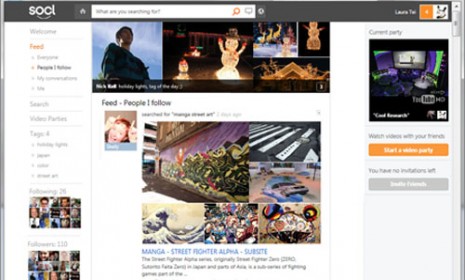So.cl: A guide to Microsoft's confusing new social network
So.cl — pronounced "social" — is being touted as a new "experiment in open search." But where does it fit within an already crowded space?

A free daily email with the biggest news stories of the day – and the best features from TheWeek.com
You are now subscribed
Your newsletter sign-up was successful
In the aftermath of Facebook's IPO, Microsoft quietly launched its own experimental social network called "So.cl" (which it insists is pronounced "social," defying phonetic reason) over the weekend. The software giant calls it an "experiment in open search," and intends the service to supplement existing social networks rather than replace them. What does that even mean? Here, a brief guide to the confusing new kid on the block:
What is So.cl supposed to be?
The service, which combines elements from more established sites like Google+ and Pinterest, is being positioned by Microsoft as a search tool for discovering new information rather than a place to waste time. The company claims the service is not a "Facebook rival or Twitter rip-off," says Charlie Osborne at ZDNet. So.cl was first tested by students as a research tool four months ago at the University of Washington, Syracuse University, and New York University. But now it's open to everyone.
The Week
Escape your echo chamber. Get the facts behind the news, plus analysis from multiple perspectives.

Sign up for The Week's Free Newsletters
From our morning news briefing to a weekly Good News Newsletter, get the best of The Week delivered directly to your inbox.
From our morning news briefing to a weekly Good News Newsletter, get the best of The Week delivered directly to your inbox.
How does it work?
First, users log-in using either their Facebook account or Windows Live ID. Once inside, users select topics of interest they want to follow, like Music, Food, Travel, or Tech. They are then taken to a "Feed" section, similar to the newsfeeds you find at sites like Facebook and Google+. The Feed displays other So.cl users' searches — which are powered by Microsoft's Bing — listing the search term the person used (for example: "james bond trailer") and the website it took them to (such as "IMDB.com") in real time. Within each post, users can leave a comment, share someone else's search, or add additional links and feedback to a thread (a feature Microsoft calls "Riffing"). The hope is that by seeing first-hand what others are searching for, So.cl users can access new information more easily.
What happens when I don't want my search to be public?
Though all searches are public by default to encourage sharing, users can toggle this feature on or off. But you still have to witness other people's searches, however unsavory. (Take this guy, for example.) "One of the biggest problems with 'social search' is that we don’t always want to see what everyone else is searching for," says Sean Ludwig at VentureBeat.
A free daily email with the biggest news stories of the day – and the best features from TheWeek.com
What else does So.cl do?
A feature called "Video Parties" is essentially Microsoft's version of Google's Hangouts. It allows multiple users to watch (and react to) the same online video simultaneously. "All video parties are based around a subject such as a singer like Katy Perry or Adele," says Ian Paul at PC World.
Why release So.cl now?
It's something of a cross-promotion. The experiment "naturally appears to have close ties" with the relaunched Bing's new emphasis on social search, says VentureBeat's Ludwig. (Read more about Bing's changes here.)
What are So.cl's chances of actually succeeding?
"Convincing users to fit this site into an already busy online life with Facebook, Google+, Twitter, and LinkedIn will be a tough sell for Microsoft," says PC World's Paul. But then again, So.cl probably isn't for everyone. The site is under the "Microsoft Research" banner and is currently marketed as "still in development," meaning users should expect to encounter bugs. At this point, only the most hardcore social networkers will probably give it a shot. Indeed. Microsoft clearly isn't trying to be the next Facebook, says ZDNet's Osborne. But as "an additional layer to the social networking world," maybe it can "become as popular as Pinterest eventually." Try it out here.
Sources: CNET, Fox News, Slashgear, PC World, VentureBeat, ZDNet
-
 Political cartoons for February 14
Political cartoons for February 14Cartoons Saturday's political cartoons include a Valentine's grift, Hillary on the hook, and more
-
 Tourangelle-style pork with prunes recipe
Tourangelle-style pork with prunes recipeThe Week Recommends This traditional, rustic dish is a French classic
-
 The Epstein files: glimpses of a deeply disturbing world
The Epstein files: glimpses of a deeply disturbing worldIn the Spotlight Trove of released documents paint a picture of depravity and privilege in which men hold the cards, and women are powerless or peripheral